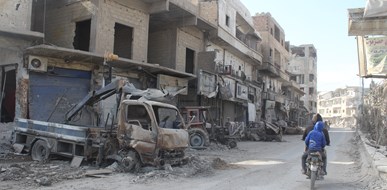Dutch senate discusses criminalisation of stay in an area controlled by a terrorist organisation
Published 12 January 2021
© Shutterstock
The Dutch Senate discussed a bill January 12 that regulates the criminalisation of persons who intentionally stay in an area under the control of a terrorist organisation. In a new ICCT perspective, Asser researcher and ICCT fellow Christophe Paulussen and co-author Emanuela-Chiara Gillard argue why this bill is problematic: ‘This is a dangerous move into the pre-crime space, far removed from actual criminal conduct.’
The ICCT perspective was published today, prior to a debate on the bill in the Dutch Senate Committee for Justice and Security (J&V). The bill regulates the criminalisation of persons who intentionally stay in an area under the control of a terrorist organisation without the permission of the Minister of Justice and Security.
Problematic bill
In the perspective, Paulussen and Gillard are expressing their doubts. Is it the most appropriate and proportionate solution for the problem? While this new tool could facilitate prosecutors’ work, and may also play a role in preventing or dissuading people from travelling to places in the world that may have a negative impact on their (and possibly our) lives, the authors think it is problematic nonetheless.
The authors write: “This is not least because it is yet another example of the shift of counter-terrorism measures into the pre-crime space, and the apparent wish to create a risk-free society. In an effort to achieve this impossible goal, other important objectives, including the provision of humanitarian assistance in accordance with humanitarian principles of impartiality, neutrality and independence, and the capacity of journalists and human rights groups to do their vital work independently and without any interference from politics, are increasingly undermined.”
Other models
“However, if criminalisation were to be pursued nonetheless, then we argue that the Australian or UK model are to be followed, through which humanitarians, journalists and human rights groups are exempted from the law. The argument is mainly a principled one: there should not be an approval mechanism in place for actors that, from a more fundamental point of view, must be able to do their work without any political interference.”
Christophe Paulussen is a senior researcher at the T.M.C. Asser Instituut. He is coordinator of the research strand 'Human Dignity and Human Security in International and European Law', coordinator of the inter-faculty research platform ‘International Humanitarian and Criminal Law Platform’ and research fellow at the International Centre for Counter-Terrorism – The Hague.
Read more:
- Staying in an area controlled by a terrorist organisation: crime or operational necessity? (ICCT Website)
- More information about this bill (in Dutch)
